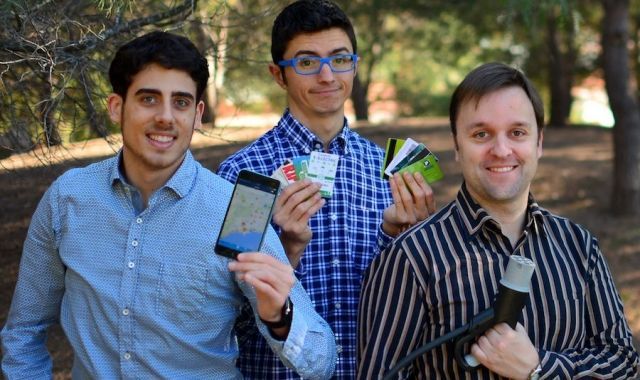
Each time drivers of electric vehicles leave town and find themselves needing a recharge, they have to make sure they have brought all the right cards, because recharging is done with RFID technology rather than coins, cash or credit cards. Josep Cester experienced this first hand after he bought his car at the start of 2015, and he did not stop thinking it over until he found a solution. His proposal is Place to Plug, the startup he set up in the summer and which these days is taking part in the Smart Mobility Congress in Barcelona.
The project aims to provide a solution to the problem of drivers who go on long trips and who pass through more than one town having to take a bunch of different cards with them, which in the end is just another obstacle to energy efficient cars becoming more established.
The startup Cester runs with a team of nine people offers a platform that puts the drivers of electric vehicles in contact with charge points, but without the need for special cards. In other words, there is no need to go to each local authority nor each operator to ask for access to charge points each time the driver needs to use one.
"The driver who does not need to recharge their car can choose one of the associated points without worrying about the operator"
Moreover, Cester wanted the tool to be collaborative, so that the owners of charge points –who usually also have electric vehicles- and public spaces can register their point and advertise its location and condition. “Thanks to this idea, the driver that needs to charge their car can choose one of the points associated with Place to Plug without worrying about the operator and they can also choose to use a private individual’s point,” says the CEO.
Hotels and restaurants can also join, even if they do not have special charge points. “A normal socket is enough,” says Cester, “although the driver has to understand it will take longer to get the battery to 100%.”
As the application also offers information on the condition of the charge points, a user can reserve a space in advance or find out ahead of time if it is being used and therefore save themselves a trip.
A little exploited segment
The monetisation is based on the annual subscription of drivers to the platform and the payment of commission every time a reservation is made. It all takes place over secure channels and the company has begun to see its first revenue from the activity of its almost 500 users so far.
In the prototype and growth stage, the firm had the help of the InnoEnergy accelerator, with whom they are working to consolidate the model.
"It was not easy to find an investor because the electric vehicle in Spain has still not taken off"
The startup also took part last year in an Acció Investment Fund, where they found their main investor. “We went there at a time we were looking for financing. It was not easy, because the electric vehicle has still not taken off in Spain, which is why it was hard to find people who were interested,” says the founder.
They have also completed a funding round with Crowdcube for 125,000 euros, an amount they have put towards marketing the product. And even though they have started with the Spanish market, and particularly in Reus, Tona, La Garriga and Granollers, their objective is to operate in the whole of Europe by the end of 2017. “Some optimistic studies say that there are 20,000 electric vehicles in Spain, but the truth is there are fewer,” he points out, “almost half of these are in fleets or are company vehicles, and as our target is the private individual, we have 10,000 potential clients at most in the national market, which is a figure that is too low.”
As Cester says, beginning in Spain has acted as trial, a period to make changes to the platform, to reinforce it and correct mistakes so as to reach the European scale with a powerful tool capable of competing with other existing projects.
The aim is to reach a minimum of 25 cities in Europe, bring together almost 30,000 charge points and have 8,000 individual users by the end of the year. They have just reached an agreement with the city of Barcelona, something the CEO believes could help them. They are also in contact with different cities in Norway and Holland, where users cannot use their points but can find about the condition of the facilities and get information about them through the app.